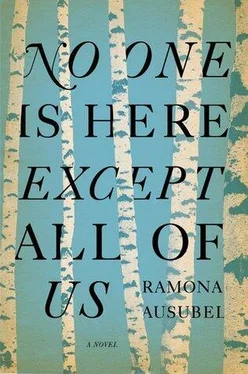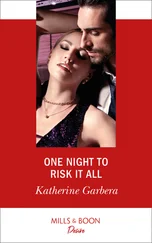“So, can I go home then?” I asked.
“Your body has to live here, but your heart can live wherever you like.”
“I get cut in half after all?”
“I’m so sorry,” she said, already turning around.
My stomach churned with confusion and hunger both. Even if breast milk had come out, I was not a baby. I sneaked into the kitchen but found little to eat. I tore the meat off a small bone left in the icebox, put it under my nightdress and took it to my room to chew on in the moonlight. Someone must have seen me, because the next night, they left a loaf of bread and a large piece of cheese out for me, as if I were a rare, wild animal they wanted to befriend. There was a note: I almost remember who you are and I definitely love you. — Father.
Did I remember who I was? Not well, not really. I made a list of everything I knew. River, mud, corners, mother, father, sister, brother, cabbage, rain, hair, arms, mountains, farm, hands, yesterday, tomorrow, kiss, meat, plates, tongues, eyes, bed, roof, tree, hunger. Everything I wrote made me think of four other things. I wrote and wrote until the list took up the whole page, until it was black with markings. Out in the world dogs kept howling back and forth to each other, not in trained operatic voices but high, rough ones. Spit, babies, snot, spoon, death, dogs, saddle, horse, rain, anger, howl.
I sent a dream to my parents across town. I was sure that it reached them, that at the exact same time we all three saw the scene together: I jumped, did a somersault, whistled, snapped my fingers — anything I could do to make them clap, and they wanted to, they wanted to laugh and cheer, but they could not. They were mute. But they found they could throw their voices into other people’s mouths. They could make Kayla and Hersh say, “Beautiful, wonderful girl, look at how much you know. We are dizzy with love for you.”
In the morning, Kayla was hanging over me like a burning sun. “Hello?” she whispered. “You don’t want to cry for me?” Kayla asked. “Don’t you want to miss me when I’m in the other room?” Dutifully, I did my best to summon sadness into my eyes. I thought of the sound of frogs coming to life in puddles outside the window of my old life, singing for a few wet, warm nights before they were silent and I would go outside to find their dry, flat forms strewn out over ground. I thought about my old father’s clatter when he woke and stood to look outside at the waiting day, while my old mother watched him quietly until he said, “Beautiful out there,” and she asked him to describe the clouds to her.
“She’s crying for me,” Kayla called to Hersh. “Oh, my little girl needs me so much.”
The old world seemed to have left us alone. No one had floated by in a boat, trying to sell us a canteen made from a sheep’s stomach. No Gypsies had passed through, rattling their wine bottles and singing their songs. Was it because we had succeeded? Because the new world was real? Perhaps. Or maybe it was because, day by day, there were fewer and fewer people left in the countryside. We had not seen the Official Gazette, which published thirty-two laws, thirty-one decrees and seventeen government resolutions against us. We did not see crosses drawn on all the doorways where Christians lived, while Jewish men were made to dig huge trenches in the cemetery. The world was emptied. Anyone who thought about it would have assumed we were long dead or on our way to death. We were forgotten and we were lost and, because of that, the world we made was allowed to go on.
Meanwhile, the healer saw patients all day. People whose anxiety about the old, the new, the broken and the saved was manifested in strange physical afflictions. The healer’s medical knowledge was sorely tested, but he knew that in most cases, all he had to do was provide a confident answer. It mattered very little what the contents of that answer were.
For demon-caused leg cramps, wear an amulet with three hairs from the bad leg and one underfeather of a sparrow.
For nighttime fever, catch an ant carrying a leaf and place it in a copper tube. Cover and shake the tube, saying, “What thou carriest on me, that I carry on thee.”
For fear of ghosts, place four beetles in a pot and pour some good wine over them. Boil for one hour and drink each morning for nine days.
If you forget your own name, if you cannot remember who you are, take your shirt off and drop it down the chimney. Then bury it at a crossroads.
For heartsickness of the unending variety, befriend a dove. Do not catch it, not even so that you can set it free. Just get down on the ground with bread crumbs on your chest and wait for it to find you interesting.
When we asked our stranger never to leave the square, we had not counted on months of gray weather. Some of the time the rain was heavy, like buckets had been upturned. Sometimes it was soft and sometimes it was just a deep, thick mist. Our water tanks filled up and overflowed and we had to shovel the mud out from in front of our doorways, but the village never floated away, even though it seemed some days like it might. Just when the streets started to become rivers, the rain would turn to mist, the streams would subside, and we would go about our lives under a blanket of fog.
Meanwhile, our stranger sat in the square. She had the coats we gave her and we even built her a little canopy out of a cowskin, which was waterproof, where the blanket had not been. This seemed very smart and kind of us. We sat there with her and asked for the health of our babies and the health of our parents and enough dry wood to keep the house warm, and our stranger wrote these things down for us, her fingers red and her boots soaked through. After praying, everyone went home and wrapped our hands around warm cups of tea, dried our socks by the fire. We had figured a day or two of this weather, a week, two weeks. But on it went.
At night, the stranger came to my window. The hugeness of what was happening was impossible to express, so we worked in a smaller currency. We traded tiny, observed facts. “The chipmunks look like they are enjoying life,” she said.
“Sometimes, when the water begins to boil, I put my face into the steam until it starts to hurt.”
“Some of us are happier than others.”
“I like it when I can feel myself falling asleep.”
“The days are getting shorter and shorter.”
“I am afraid of not being myself anymore. I feel like I’m disappearing or something.”
“Yes,” she said. “I know what you mean.”
The jeweler’s cheeks were sallow with worry. He had stopped sleeping, and ate only what the stranger left on the plates he brought to her. He was angry with her for being so obedient. If only she had insisted, told the villagers that she would sit during the day but come home — home to his house — at night. After a lifetime of waiting, a companion had appeared out of the heavens for him, dropped down like a gift from God, and been taken away by the petty selfishness of other people.
Most villagers were not aware of his discontent. We were busy worrying about the rain and our own morning-till-nights. Our houses were full of hanging clothes, which left puddles underneath themselves. When we wanted to leave our houses to walk to the shops or work, we made our way along the line of garments, feeling each one, looking for the driest, but nothing was dry. We smelled like drenched sheep all the time, our necks itchy under wet scarves.
Some people began to notice that our stranger was not writing as vigorously as she had been. The jeweler peeked over her shoulder and discovered a soggy list:
Money
Love
Health (mother, father, children, spouse, self, others)
Sex
Читать дальше












